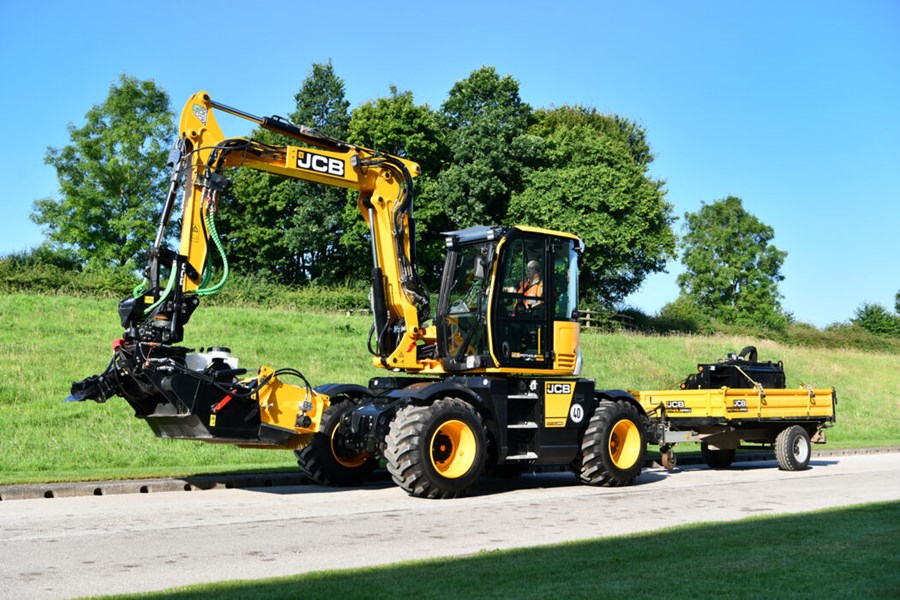JCB was amongst others celebrating after securing a change in regulations which will allow trailers to be towed on the road by wheeled construction machinery – potentially saving customers thousands of pounds a year.
The decision affects towing rules in England, Scotland and Wales and has seen the Vehicle Certification Agency (VCA) create a new Vehicle Special Order (VSO). Under the new regulation, it will be possible for customers to use wheeled engineering plant, such as backhoe loaders and wheeled excavators, to tow a trailer on the highway, for the purposes of construction, maintenance and repair of roads.
Richard Brooks, JCB’s Group Product Innovation Director commented, “Recognition by the VCA of the benefits of safely towing a trailer behind these types of wheeled machines will be welcomed by contractors and equipment owners. We have been pushing for this change in legislation, as it will greatly increase the versatility and productivity of this type of wheeled machine.”
“By towing a trailer to and from site, customers will reduce the need for additional vehicles to carry materials and tools, cutting emissions and unnecessary traffic, while increasing efficiency in road construction maintenance and repair.”

It has taken some years for JCB to demonstrate to the Department for Transport (DfT) and VCA that this is an effective and efficient use of machinery and will facilitate, amongst other issues, the repair of potholes. While this is only a temporary derogation to The Road Vehicles (Authorisation of Special Types) General Order 2003, the company remains committed to a permanent change and will continue to work with all agencies to effect this.
Despite the availability of trailer hitches and towing equipment for a range of wheeled machines, it has until now, not been possible for this type of machinery to legally tow a trailer on public highways. Under the new order, backhoe loaders like JCB’s 3CX Compact, along with wheeled excavators such as JCB’s Hydradig and Pothole Pro, will now be permitted to tow a trailer that is unladen, or that is carrying material or tools to and from a road construction, repair or maintenance site, greatly increasing versatility and productivity for the customer, while reducing the need for additional transportation.
The machines will be allowed to tow on all types of roads, other than motorways, at speeds of up to 20mph. The wheeled engineering plant must be road-registered and shall comply with all applicable aspects of the Road Vehicles (Construction and Use) Regulations 1986. The overall length of the machine cannot exceed 8m and the trailer must bear the same number plate as the towing machine.
Written Applications
Operators wanting to take advantage of this change in the law, can apply in writing to the VCA, advising that they wish to use a machine, or a number of machines, to tow on the road. Applications should be submitted to vso@vca.gov.uk and must include the name of the person or organisation making the application.
Purpose Built
JCB has a range of purpose-built towing equipment for the 3CX Compact and for the Hydradig 110W and Pothole Pro wheeled excavators. The 3CX towing hitch has a maximum towing capacity of 3.5-tonnes, with a 5-tonne recovery capacity. This adjustable height hitch comes with a 50mm ball, as well as a clevis type connection, to suit different trailer attachments. It has a maximum nose load of 250kg and the hitch folds away under the rear frame when not in use, to allow the backhoe to operate. Full seven-pin towing electrics are also available from JCB and its dealers.
The Hydradig 110W is offered with a choice of hitches, using a Rockinger connection, or a ball and clevis design. These hitches are mounted to the dozer blade, using a square cut-out in the blade surface. A quick-release pin holds the hitch in place while in operation. Again, standard seven-pin trailer electrics are available for the Hydradig range, to provide power for lighting.
To further support the use of a trailer, the Hydradig can be equipped with single acting auxiliary, or single and double acting auxiliary hydraulic functions at the rear of the lower chassis frame. The single acting function can be used to power the trailer tipping cylinder, while the double acting service can be used to open and close hydraulic trailer doors.
